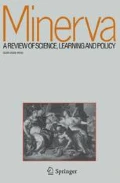Conclusion
The Allison Commission focused attention on the administration of the scientific bureaux and its relation to the jurisdictional system in the Congress. The commission also had a more considerable influence on congressional policy towards the scientific bureaux than was previously thought. Legislative recommendations offered by the Allison Commission became law, even if they avoided the notice of congressional opponents through the strategic manipulation of the appropriations process. Hilary Herbert was not a crude enemy of science, but a staunch defender of the obligations of Congress to scrutinise the expenditure of funds it allocated.
This detailed political history of the Allison Commission is a necessary part of any history of American science policy. William Boyd Allison and Hilary Herbert were, no less than scientists like Powell, initiators of a tradition which has continued to be important in American governmental science policy.
The form of the special committee devoted to scientific issues was initiated by the Allison Commission. It prefigured more recent and familiar congressional inquiries like the Joint Committee on Atomic Energy, the Government Operations Committee under Representative Fountain, the House Science Policy Task Force, and the Energy and Commerce Committee under Representative Dingell. The attentiveness to details like pay, printing, food and morale—as small but manageable parts of the larger enterprise—foreshadows more contemporary inquiries into the details of the procedures for awarding grants and contracts and the assurances of financial and scientific integrity. The mechanisms of control applied to governmental science by the Allison Commission—particularly itemised appropriations, but also control over personnel through promotions and control of bureaucratic organisation by virtue of congressional rather than disciplinary organisation—stand as early examples of how Congress may continue to exert its constitutional authority to scrutinise an innovative and entrepreneurial scientific community.
Similar content being viewed by others
Rights and permissions
About this article
Cite this article
Guston, D.H. Congressmen and scientists in the making of science policy: The Allison Commission, 1884–1886. Minerva 32, 25–52 (1994). https://doi.org/10.1007/BF01096655
Issue Date:
DOI: https://doi.org/10.1007/BF01096655




